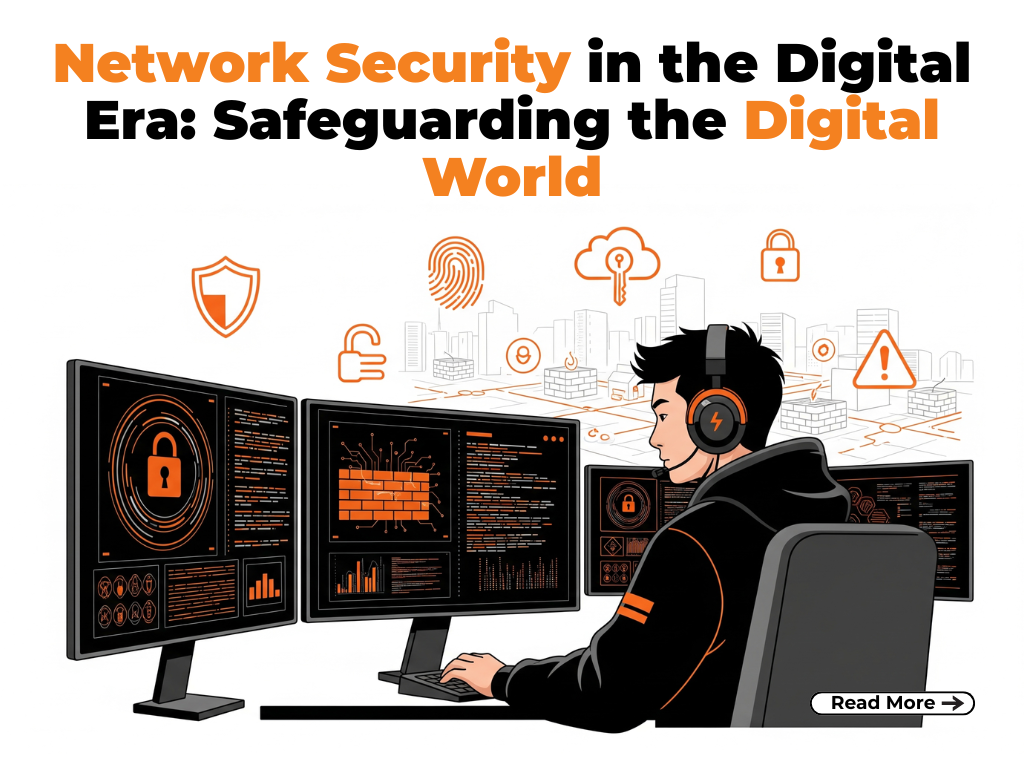In today’s hyper-connected digital ecosystem, network security has emerged as a non-negotiable pillar for ensuring safe and reliable online activity. With the widespread integration of the internet into virtually every aspect of our lives—ranging from financial transactions and healthcare systems to education, governance, and global commerce—the potential consequences of cyber threats have grown more serious than ever before. In this context, safeguarding data, infrastructure, and communication channels from cyberattacks has become crucial for maintaining digital trust and societal stability.
Cybersecurity in the digital era demands proactive defense strategies that evolve alongside modern threats. As our dependency on digital platforms deepens, the scope and sophistication of cyber threats have simultaneously expanded. Cybercriminals now use advanced techniques, including ransomware, phishing, zero-day vulnerabilities, and even AI-powered attacks to breach systems. These attacks are no longer limited to large corporations or governments; small businesses, academic institutions, and even individuals are being targeted with increasing frequency. In many cases, the resulting data breaches can lead to identity theft, financial losses, and long-lasting reputational damage.
Today, digital security solutions must address both human error and technical vulnerabilities. One of the most dangerous forms of attack today is ransomware, where attackers encrypt data and demand payment for its release. Similarly, phishing schemes trick users into disclosing sensitive information by posing as trustworthy entities, often through fake emails or websites. Zero-day exploits, on the other hand, take advantage of software vulnerabilities that are not yet known to the developers, making them especially dangerous. More recently, attackers have begun to leverage artificial intelligence to launch more adaptive and precise cyberattacks that evade traditional security mechanisms.
Importance of network security cannot be overstated in preventing widespread damage and chaos. To effectively combat these threats, organizations and individuals must adopt a comprehensive and multi-layered approach to security. Network security is no longer just about installing firewalls or antivirus software; it now involves a combination of technical solutions, strategic planning, and human awareness. Core principles such as defense in depth, least privilege access, continuous software updates, user education, and proactive threat monitoring are essential components of a modern security framework.
- Defense in depth involves deploying multiple layers of security controls throughout an IT system, thereby creating redundancy and ensuring that even if one layer fails, others remain in place to protect data.
- Least privilege access ensures that users have only the permissions necessary to perform their tasks, reducing the chances of internal breaches or accidental misuse.
- Routine patching and updates are crucial to fixing vulnerabilities before they can be exploited.
- User training and awareness programs empower employees and users to recognize suspicious activities and phishing attempts, which are often the starting point of larger breaches.
- Real-time threat monitoring enables quick detection and response, reducing the potential impact of an attack.
Data protection strategies should also include robust encryption and regular backups to mitigate data loss. In recent years, the integration of AI and machine learning in cybersecurity has significantly improved the ability to detect and respond to threats. These technologies can analyze vast volumes of network data, identify unusual patterns, and predict attacks before they happen. They can also automate responses, reducing the time it takes to neutralize threats. This proactive stance is increasingly essential, given the speed and stealth with which modern cyberattacks occur.
Cyber threats and prevention go hand in hand as essential elements of organizational resilience. Looking toward the future, the emergence of 5G technology and quantum computing poses new challenges and opportunities in the cyber security landscape. While 5G promises faster connectivity and more interconnected devices, it also broadens the attack surface, demanding new strategies for securing edge devices and decentralized networks. Quantum computing, with its immense processing power, could potentially break existing encryption algorithms, making it imperative to develop quantum-resistant cryptographic techniques.
Network security tools such as intrusion detection systems and firewalls remain vital in defense strategies. Amidst this ever-changing environment, the role of education and training cannot be overstated. There is a growing global demand for skilled cybersecurity professionals capable of addressing complex threats with agility and insight. Educational institutions, therefore, have a responsibility to not only impart theoretical knowledge but also provide practical exposure to real-world security challenges.
One such institution making notable strides in this direction is Lovely Professional University (LPU). Renowned for its forward-thinking academic programs and industry engagement, LPU has established itself as a leader in cybersecurity education in India. The university offers specialized courses, certifications, and degree programs focused on information security, ethical hacking, cryptography, and network protection.
LPU’s state-of-the-art laboratories, experienced faculty, and strong industry partnerships enable students to gain hands-on experience with the tools, techniques, and scenarios they will encounter in their careers. The university also supports research and innovation in cybersecurity, encouraging students to develop solutions to contemporary security problems. Its startup incubators and tech competitions foster an entrepreneurial mindset among budding cybersecurity experts.
Protecting online assets is a priority, and institutions like LPU are preparing students to rise to the challenge. Moreover, LPU’s remarkable placement record reflects its success in producing job-ready professionals. Graduates have gone on to work with top tech companies, security firms, and government agencies. LPU’s emphasis on practical training, certification programs, internships, and industry projects ensures that its students are not just academically sound but also ready to face real-world challenges head-on.
As the digital landscape becomes more complex, institutions like LPU are crucial in shaping the future of cybersecurity. By nurturing talent, fostering innovation, and promoting ethical hacking practices, LPU is helping to build a new generation of defenders in the digital realm.
Conclusion
In the digital age, network security is not just a technological concern—it is a societal imperative. As threats evolve in scale and complexity, the demand for innovative solutions and skilled professionals continues to rise. Institutions like LPU, with their focus on cutting-edge education, research, and industry engagement, are playing a pivotal role in addressing this global challenge. For aspiring cybersecurity professionals, the opportunities have never been greater—or more meaningful. With the right foundation and mindset, they can make a lasting impact in safeguarding the digital world.













